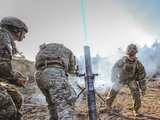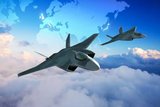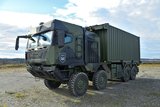NATO exercise sharpens explosive defeating skills in the face of increasing threats
Northern Challenge 23 ended earlier this month. (Photo: NATO)
Northern Challenge 23 exercise has concluded with participants responding to simulated explosive threats each day of the two-week event. Each scenario was designed to become more complex with the addition of multiple simulated IEDs to be neutralised in the face of an agile adversary.
It took place in Keflavik, Iceland led by the Icelandic Coast Guard and ran between 21 September and 4 October.
Sixteen countries and 430 personnel took part including Belgium, Canada, Denmark, France, Germany, Iceland, Lithuania, Netherlands, Norway, Poland, Slovakia, UK and US, as well as partner nations Austria, New Zealand, and Sweden. For the first time USMC personnel
Access this article and other Decisive Edge Newsletter news content with a free basic account
You will also get one free Premium News article each week
Already have an account? Log in
More from Decisive Edge Newsletter
-
![Final two contenders for key £2 billion British Army training contract selected]()
Final two contenders for key £2 billion British Army training contract selected
The two remaining bidders for the flagship Army Collective Training Service (ACTS) contract will move on to the next 20-week phase to select the British Army's Strategic Training Partner.
-
![Cubic tailors mortar simulator for the US Army]()
Cubic tailors mortar simulator for the US Army
The company’s mortar trainer received improvements based on soldier’s feedback.
-
![I/ITSEC 2024: Zeiss introduces Velvet 4K SIM projector for night flight simulation]()
I/ITSEC 2024: Zeiss introduces Velvet 4K SIM projector for night flight simulation
The next-generation platform is motion-compatible and can be used in OTW and NVG applications.
-
![I/ITSEC 2024: Babcock Immersive Training Experience debuts in US]()
I/ITSEC 2024: Babcock Immersive Training Experience debuts in US
Named BITE, the system simulates the battlefield environment with multiple sensorial stimuli.
-
![What Saudi Arabia’s GCAP involvement could mean for the UK]()
What Saudi Arabia’s GCAP involvement could mean for the UK
Analysts have said that making space for the country in the sixth-gen fighter aircraft initiative could give the UK a chance to ease the financial burden of the aircraft’s development.
-
![Rheinmetall locks in $950 million purchase of US company to strengthen position]()
Rheinmetall locks in $950 million purchase of US company to strengthen position
Rheinmetall is working to open up the US market and the potential billions of dollars on offer. In order to get in the door it has purchased engineering company Loc Performance Products.


























